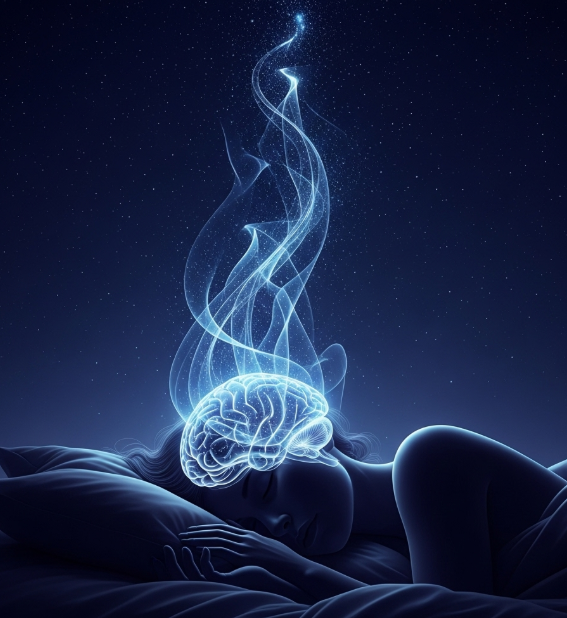The Art of Rest: A Deep Dive into Why You're Always Tired and How to Truly Fix Your Sleep
Feeling constantly drained in a world that glorifies burnout? This in-depth guide goes beyond simple tips to explore the science of sleep deprivation and its devastating impact on your mind, body, and performance. Discover the intricate mechanisms of your biological clock and learn a powerful, actionable framework to master your sleep, reclaim your energy, and thrive in an always-on world.
6/26/20257 min read


The Modern Sleep Paradox
We live in a world of profound contradiction. We have access to more information, technology, and opportunities than ever before, yet we are collectively more exhausted than any generation in history. You might feel it as a low-grade hum of fatigue throughout your day, a reliance on that third cup of coffee just to stay focused, or the frustrating experience of lying in bed at night, physically exhausted but with a mind that refuses to switch off. This is the modern sleep paradox: being constantly "tired but wired."
Good sleep has been relegated from a biological necessity to a dispensable luxury. In a culture that worships productivity and the "hustle," sleeping for eight hours can feel like a wasteful indulgence, a sign of weakness. We accumulate "sleep debt" like a badge of honor, telling ourselves we'll catch up on the weekend—a myth we will later dismantle. But this neglect comes at a staggering cost.
This isn't just about feeling groggy. The erosion of our natural sleep patterns, first by the rigid schedules of the industrial revolution and now by the endless blue light of the digital age, is a silent epidemic. It’s a crisis that affects every aspect of our existence, from our cognitive function and emotional stability to our physical health and longevity. Understanding and reclaiming our sleep is no longer just a wellness trend; it is one of the most critical acts of self-preservation in the 21st century.
The High Cost of Sleep Deprivation: What's Really Happening to Your Body and Mind?
When you consistently get less than the required seven to nine hours of sleep, you aren't just losing time for rest; you are actively inflicting damage on your biological systems. Let's pull back the curtain on what's truly happening inside you during a state of sleep deprivation.
Cognitive Decline and The Foggy Brain The first casualty of poor sleep is your prefrontal cortex, the brain's executive suite responsible for decision-making, problem-solving, and creativity. Without adequate sleep, this area becomes sluggish. Studies using fMRI scans show reduced activity in the prefrontal cortex of sleep-deprived individuals, impairing their ability to assess risks, think laterally, and generate innovative ideas. Your memory consolidation process, which occurs primarily during deep sleep stages, is severely hampered. This is why after a poor night's sleep, you may struggle to recall information, learn new skills, or maintain focus during important tasks. It's not a lack of willpower; your brain is literally operating with a diminished capacity.
Emotional Instability and The Hair-Trigger Temper Have you ever noticed how a lack of sleep makes you irritable, anxious, or quick to anger? This is due to the amygdala, your brain's emotional rapid-response center. Sleep deprivation causes the amygdala to become hyper-reactive, increasing its activity by up to 60%. Simultaneously, the connection between the amygdala and the moderating influence of the prefrontal cortex weakens. The result is an emotional hair-trigger. You react more strongly to negative stimuli, perceive neutral situations as threatening, and lose your ability to regulate your emotional responses. This can lead to increased conflict in personal and professional relationships, creating a vicious cycle where stress causes poor sleep, and poor sleep causes more stress.
Physical Health Breakdown: A System Under Siege The physical toll of sleep deprivation is both systemic and severe.
Weakened Immunity: During sleep, your immune system produces and releases cytokines, a type of protein that targets infection and inflammation, creating an immune response. Skimping on sleep means your body produces fewer of these protective proteins. This leaves you more vulnerable to common viruses, like the common cold, and can prolong recovery time from illness.
Metabolic Chaos and Weight Gain: Poor sleep is a direct pathway to metabolic dysfunction. It disrupts the hormones that control appetite: leptin (which signals satiety) decreases, while ghrelin (which signals hunger) increases. This hormonal imbalance creates intense cravings for high-calorie, sugary, and fatty foods. Even more concerning, insulin sensitivity can plummet after just a few nights of insufficient sleep, forcing your pancreas to work harder and dramatically increasing your long-term risk of developing Type 2 diabetes.
Cardiovascular Strain: Your cardiovascular system relies on the restorative dip in blood pressure and heart rate that occurs during deep sleep. Without it, your blood pressure remains elevated for longer periods. Chronic sleep deprivation is linked to hypertension, increased levels of C-reactive protein (a key marker for inflammation and heart disease risk), and a greater overall strain on your heart.
The Science of Sleep: Understanding Your Internal Rhythms
To fix a problem, you must first understand the system. Sleep isn't just an "off" switch; it's a highly complex and active process governed by two main forces.
The Circadian Rhythm (Process C): Your Master Clock Deep within your brain's hypothalamus lies a cluster of about 20,000 neurons called the suprachiasmatic nucleus (SCN). This is your body's master biological clock. The SCN governs your 24-hour cycle of sleep, wakefulness, hormone release, and body temperature. Its most powerful external cue is light. When light enters your eyes in the morning, it signals the SCN to suppress melatonin production and start the "daytime" cycle. Conversely, as darkness falls, the SCN prompts the pineal gland to release melatonin, the hormone that facilitates the transition into sleep. Living out of sync with this natural light-dark cycle is a primary cause of sleep problems.
Sleep Pressure / Homeostatic Drive (Process S): The Adenosine Timer From the moment you wake up, a chemical called adenosine begins to accumulate in your brain. The longer you are awake, the more adenosine builds up. This accumulation creates what scientists call "sleep pressure"—that growing feeling of drowsiness you experience as the day goes on. When you sleep, your brain clears away this adenosine, reducing the pressure and allowing you to wake up feeling refreshed. This is how caffeine works: it's an adenosine antagonist, meaning it temporarily blocks adenosine receptors in your brain, masking the feeling of tiredness. It doesn't eliminate the adenosine, however, which is why you experience a "crash" when the caffeine wears off and all that built-up sleep pressure hits you at once.
Your Action Plan for Restorative Sleep
Understanding the science is the first step. Taking action is the next. Here is a powerful, three-step framework to reclaim your sleep.
Step 1: Make Your Sleep Non-Negotiable The single most impactful change you can make is to treat sleep as the most important appointment of your day. In our culture, we use alarms to force ourselves awake, but we rarely use them to force ourselves to go to bed. Start now. Set a "wind-down" alarm for 60-90 minutes before your target bedtime. This is a non-negotiable signal that the day's work is over. Communicate this boundary to your family and colleagues. Protecting this time is not selfish; it is a prerequisite for being your best self the next day. This consistency, especially maintaining the same wake-up time even on weekends, is the most powerful way to anchor your circadian rhythm.
Step 2: Engineer Your Environment for Perfect Sleep (Sleep Hygiene 2.0) Sleep hygiene is more than just avoiding coffee at night. It's about actively creating an environment that sends powerful cues to your brain that it's time for rest.
Control the Light: Light is the enemy of melatonin. In the 1-2 hours before bed, dim the lights in your home. Install blue-light-filtering software on your devices or, better yet, put them away entirely. Invest in blackout curtains to make your bedroom a cave of darkness. If you need to get up at night, use a dim, red-toned nightlight, as red light is the least disruptive to melatonin.
Control the Temperature: Your body temperature needs to drop slightly to initiate and maintain sleep. The ideal room temperature for sleeping is between 18-20°C (65-68°F). A room that is too hot is a common and often overlooked cause of restless nights.
Control the Sound: A quiet environment is best, but for those living in noisy areas, sound can be a tool. White noise, pink noise, or the sound of a fan can mask disruptive sounds by creating a constant, soothing auditory backdrop.
Develop a Wind-Down Ritual: You cannot expect your brain to go from 100 to 0 in five minutes. Create a 60-minute pre-sleep buffer. This could include: 20 minutes of light tidying, 20 minutes of reading a physical book (not on a screen), 10 minutes of gentle stretching, and 10 minutes of journaling or meditation to clear your mind.
Step 3: Move Your Body to Rest Your Mind Daily physical activity is a potent, non-pharmacological tool for improving sleep. Exercise increases the duration of your deep sleep stages and can help realign a disrupted circadian rhythm. It also serves as a powerful outlet for stress and anxiety. The key is timing. A vigorous workout in the morning or afternoon is ideal. For some people, intense exercise too close to bedtime (within 2-3 hours) can be overstimulating. However, gentle, restorative activities in the evening, such as yoga, tai chi, or light stretching, can be incredibly beneficial for calming the nervous system and preparing the body for sleep. Remember, the goal is not exhaustion, but a healthy level of physical fatigue that encourages mental rest.
Conclusion: Reclaiming Your Rest, Reclaiming Your Life
We have been conditioned to view sleep as a passive state of inactivity, a period of lost time that could be better spent working, learning, or consuming. The truth is precisely the opposite. Sleep is one of the most active and productive processes we undertake. It is during sleep that we heal, learn, grow, and restore our capacity to engage with the world effectively.
Choosing to prioritize your sleep is not an act of surrender to a demanding world; it is a powerful act of rebellion against it. It is a strategic decision to invest in your most valuable assets: your physical health, your mental clarity, and your emotional resilience. The journey to better sleep begins not with the dimming of the lights tonight, but with the decision you make right now to honor your fundamental need for rest. Reclaim your sleep, and you will undoubtedly reclaim your life.
Tags
Sleep, Insomnia, Sleep Hygiene, Circadian Rhythm, How to Sleep Better, Improve Sleep Quality, Chronic Fatigue, Stress and Sleep, Melatonin, Sleep Deprivation, Brain Health, Cognitive Function, Mental Health, Productivity, Wellness
Nature
Explore natural solutions for your health.
Health
Solution
info@termeszeteslet.hu
+36123456789
© 2025. All rights reserved.
